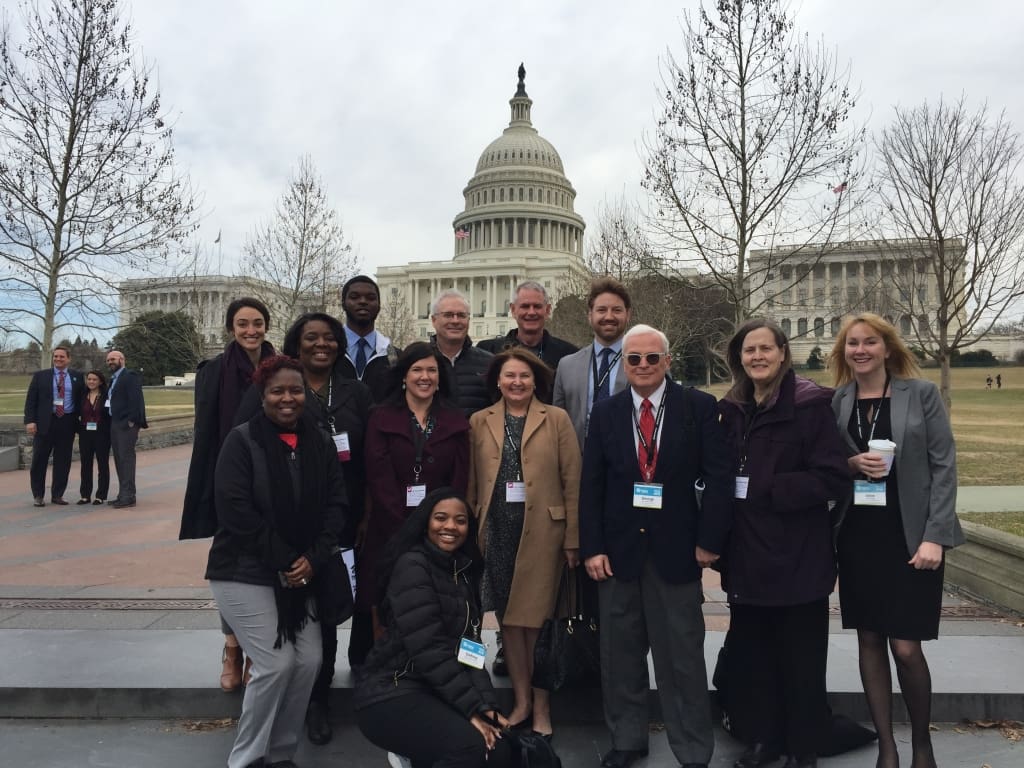
Federal
Budget Deal
Friday morning, February 9, Congress passed a $500 billion spending bill that includes a Continuing Resolution through March 23. The bill sets the stage for a bipartisan, omnibus spending package for FY18. The deal has lifted the harmful spending caps by $300 billion over two years and includes a disaster aid package. For more details, visit NLIHC’s analysis
President’s budget proposal devastates affordable housing
The White House released its budget proposal last week as Samuel Gunter was in Washington, D.C. to visit the North Carolina delegation. The proposal cuts HUD’s funding by $8.8 billion or 18.3% and would be a disaster for affordable housing. For glimpse at the budget numbers as compared to previous proposals in previous years, click here. To read a more detailed run-down, read NCHC’s summary from last week
White House releases infrastructure plan
Last week, the White House released a 55-page legislative framework outlining a $1.5 trillion infrastructure package. The plan relies heavily on public-private partnerships and state/local funding, and is structured around four main goals:
- Generating $1.5 trillion for the package;
- Streamlining the permitting process;
- Investing in rural infrastructure;
- and advancing workforce training.
Missing in the proposal is affordable housing as an goal. Read more from our partner Enterprise on the need to include housing in any infrastructure package, given the connections between access to affordable housing, job growth and economic mobility.
FHFA protects National Housing Trust Fund and 2018 allocation announced
From NLIHC – The Federal Housing Finance Agency (FHFA) announced on February 14 that it would protect funding for the national Housing Trust Fund (NHTF) in 2018. The recently passed tax law caused a devaluation of Fannie Mae and Freddie Mac’s deferred assets, forcing them to take a draw from the Treasury and putting funding for the HTF at risk. Under federal statute, the FHFA director has the broad authority to suspend contributions to the HTF if they would have a negative impact on the financial stability of the enterprises. With FHFA’s decision to maintain the contributions, the enterprises are expected to provide nearly $269 million to the HTF in 2018. North Carolina is expected to receive $5,018,000 this year from the NHTF.
Housing Counseling sign-on letter
The National Housing Resource Center is asking for sign-ons to a letter asking members of Congress to include a request for $65M for Housing Counseling Assistance in the FY 2019 appropriation. A strong showing of support on this letter will make a big difference on the impact it has with members of Congress and their willingness to make housing counseling funding a priority. The deadline for sign-ons is Wednesday, February 28th at 5 PM ET. You can sign on here.
Section 4 sign-on letter
The President’s FY 2019 budget request proposes eliminating HUD’s Section 4 Capacity Building and Affordable Housing program, which is the only federal program exclusively focused on increasing the effectiveness of local community development organizations. Enterprise is co-sponsoring a nationwide sign-on letter urging Congress to provide at least $40 million for the Section 4 program in fiscal year (FY) 2019.
HOME sign-on letter
The HOME Coalition is urging lawmakers to increase funding for the HOME Investment Partnerships Program (HOME) to $1.2 billion in the Fiscal Year (FY) 2018 Transportation, Housing, and Urban Development (THUD) Appropriations bill. To read the letter and sign on by Thursday, February 22, click here.
Local

A Matter of Faith: Habitat Wake Policy Forum March 4
Join Habitat Wake, Samuel Gunter of NC Housing Coalition, and leaders of the Interfaith Build on March 4 for a discussion on the growing need for affordable housing in Wake County and throughout North Carolina, and how becoming an affordable housing advocate is a matter of faith. For more details, click here.
Orange County Summit
The Orange County Affordable Housing Coalition will be hosting a summit to bring together elected officials, government staff, community organizations, and the public to have a conversation about affordable housing development in the county.Registration and coffee will begin at 10:00 am, and summit attendees will have the opportunity during this time to visit stations provided by our community’s affordable housing providers, detailing their planned projects, development through collaboration, and how projects are financed.
UNC School of Law: There’s No Place Like Home: Housing in Crisis
The 2018 Conference on Race, Class, Gender, & Ethnicity will examine both the positive advances as well as the stalled progress in law and policy to address the crucial housing issues faced by so many, focusing on North Carolina. To explore these issues, the Conference invites practitioners, academics, advocates, and local community members to consider how the law has both supported and failed those seeking shelter and stable, affordable housing, and what steps can be taken to ensure that housing is guaranteed as a human right for individuals and families. Register for the event here.
Habitat Charlotte’s “Building Futures Symposium on Affordable Housing”
Join Habitat Charlotte for the third-annual Building Futures: A Symposium on Affordable Housing. This year’s event features Dr. Tererai Trent – an internationally-renowned scholar, humanitarian, motivational speaker, educator & author. Dr. Trent recently won the 2018 NAACP Award for Outstanding Literary Work (Instructional) for her latest book, The Awakened Woman. This event is free and open to the public; we only ask that you secure your spot by registering in advance here.
Durham Housing Trust Fund
Under the leadership of Phail Wynn, vice president for Durham and regional affairs at Duke University, the city is working to set up an affordable housing trust fund. Housing trust funds aren’t uncommon, but it appears Durham’s will be unique in that it will rely on private contributions, rather than primarily on governmental resources. Durham Mayor Steve Schewel says a trust fund would provide a more flexible addition to the city’s existing Dedicated Housing Fund. He envisions a $15 million fund, with about 10 percent of that coming from the city and the rest from private sources, such as Duke University or financial institutions. The money would be loaned mostly to nonprofit developers.








